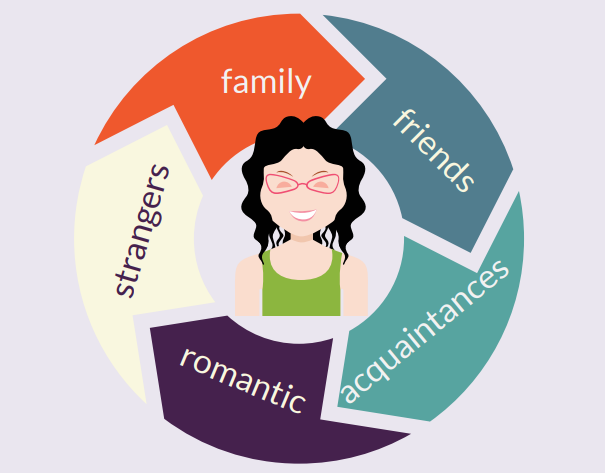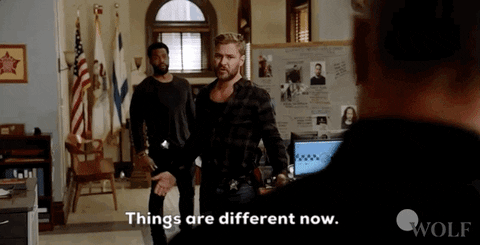
Relationships are the bedrock of life. Healthy and meaningful connections ground us. As we get older, it becomes harder to find and nurture them. Once we find a partner, they and our children come first, and other relationships become “nice-to-haves.” But there are plenty of opportunities to connect, and you don’t have to be limited by the traditional template of relationships. Learn about the different types of relationships and how to choose the right ones for you. (Estimated reading times: 9-10 minutes)
“Relationships don’t always make sense. Especially from the outside.”
— Sarah Dessen
Relationships are the bedrock of life. Most of us would rank healthy and meaningful relationships at the top of our list of essential things in life.
A hug from a family member, a fun night out with friends, holding hands with our beloved, or a brief but enjoyable exchange with our next-door neighbor — each of these connections plays a vital role in the tapestry of our experiences.
Humans are social creatures. We’re meant to be around other people and seek companionship. Studies show that our bodies and minds work better when we’re not alone. We’re less prone to stress and our happiness increases, and even people who give us a hard time provide growth opportunities.
Relationships tend to be easier to form and nurture when we’re younger. We regularly meet new friends and romantic partners in school, college, and extracurricular groups and bond over common issues. We’re also surrounded by our family and relatives when we live in their homes.
As we get older and move out into the world, we’re less likely to be in spaces where we meet new people and spend time with them regularly. As a result, according to research, more than 35% of adults in the U.S. say they feel lonely (from 2020 Trusted Source).
My focus on relationships has dwindled over the past few years because of various circumstances, and I found myself slipping into loneliness. Building my content platform, going back to university to get another degree, relocation, and the pandemic meant that relationships took a backseat.
When I browsed through my old photos, I realized how much I missed the feeling of camaraderie and fun conversations I had with people with whom I had strong ties. I decided to make time to get out there, be more social, and revitalize my existing connections.
I believe that we can all benefit from having strong and supportive people who bring out the best in us and make us better people. In his book, “Road to Character,” journalist David Brooks writes, “The people who really have character make deep, unshakable connections to something outside themselves.” The right types of relationships ground and anchor us.
Even if you’ve had relationships that have gone sour, platonic or romantic, and you’re nervous about getting out there, know that it’s well worth the effort. Once you know how to navigate and network, you’ll eventually find your kindred spirits.
Basic types of relationships

Making new connections and investing in them is a form of self-care. We can enjoy them even more if we have different types of relationships with a wide range of people.
Being in a relationship doesn’t always have to involve emotional attachment, commitment, and/or physical intimacy. All kinds typically fall into one of these categories:
- Family relationships
- Romantic love relationships
- Work relationships
- Acquaintances
Each type of relationship differs greatly in terms of importance, closeness, and frequency of contact, and also falls into different subcategories.
As a culture, we tend to put a lot of emphasis on romantic love and pay less attention to others. Once we find a partner, they and our children come first, and friendships and other relationships become “nice-to-haves.”
Unlike formal bonds, friendships lack structure, and maintaining them is based purely on availability and convenience. We can go for months and years without seeing a friend, but we can’t go for very long without our children or spouses.
Given our hectic lives, prioritization is essential, but we must do it with the knowledge that we need a good mix of all types of people to feel fulfilled.
Part of the problem of focusing on only close connections is that, in English, we’re linguistically starved. There’s only one word to describe the feeling of love in English, but in Greek, there are six.
According to the ancient Greeks, there is a buffet of love we can feast on. They had six words that capture the essences of love we experience in different types of relationships:
- Eros – sexual passion
- Philia – deep friendship
- Ludus – playful love
- Agape – love for everyone
- Pragma – long-standing love
- Philautia – love for self
Almost every spiritual tradition postulates that love has the highest frequency in the Universe. By tapping into various forms of love and opening our hearts, we raise our vibration and the vibration of the collective consciousness.
As the Persian poet Rumi said: “Your task is not to seek for love, but merely to seek and find all the barriers within yourself that you have built against it.” You’ll attract the right people into your space when you’re open and available.
A new model of love: why we need a different approach to relationships

Today, a one-size-fits-all approach toward relationships does not work. Yet, some of us still subscribe to the archaic cookie-cutter model of finding love and friendships we were exposed to growing up.
Society approves of a long-term, committed partnership, where two people come together for practical reasons such as financial security and raising a family. Friendships are formed by default based on where we find ourselves and take a passive approach.
The old relationship format made sense when living conditions were very different from what we now experience. The pool of people our ancestors could mingle with was limited. Going for the tried-and-tested ways during their shorter life spans was simpler and more efficient.
Now people live longer and have access to the whole world at their fingertips. A person living in Miami can hop on a plane to a meditation community in Bali once a year. A single person can log on to a dating app and find their soulmate in other states and countries.
Both men and women are active in the workforce, and women no longer have to marry for economic security and social appraisal. She can partner up for love and companionship.
Given this new landscape, most people (in cultures that offer personal freedoms) now have the luxury of hand-picking different types of relationships based on their needs, lifestyle preferences, and the emotional experiences they want to have.
Relationships are less transactional and practical, and are now based on common interests, values, and affection. Although every relationship can look different, these are some relationship needs that we all share:
- Affection (includes words of acceptance, physical touch, and kind acts)
- Validation/Acceptance
- Independence
- Trust
- Thoughtfulness
- Respect
The importance of each of these emotional needs varies from person to person. For example, some people value trust over affection, or thoughtfulness over personal space and independence.
We might also have specific needs based on our personalities and aspirations. An introverted writer might be happy with having one or two close friends so they can focus on their creative projects. On the other hand, a socialite might want to know the who’s who and rub shoulders with influential people to elevate their status.
There is no right or wrong approach. Whether you want to keep things light or be more emotionally involved in your connections is entirely up to you. Just know the consequences of entering the dynamics of these types of relationships and what you must do to be fully present in them.
How to choose the type of relationships that are right for you

No two relationships are alike, even if you are the common denominator. The dynamic you share with another person will differ because of how your energies blend. Like trying on a shoe, you’ll only know if it fits and what it feels like when you interact with the person and spend some time with them.
Relationships of all kinds have structures and rules, some pre-determined based on social norms and others defined by the two parties involved.
Awareness of how you and the other person relate to and behave with each other will set expectations and make it easier to be part of the connection. It also makes it easier to check in with ourselves and gauge whether or not the relationship is aligned with our values.
The most socially accepted relationship structure is a monogamous, committed, romantic relationship and it’s been heavily idealized by the media and commercial enterprises.
Whether it’s the “happily ever after” fairytale romance or the 3-carat diamond engagement ring, we believe that finding that special someone is the be-all and end-all of all relationships. There’s no denying that a happy marital connection can be one of the most fulfilling ones we can have, but it’s not the only one out there.
Too many people spend so much time searching for “the One” and, in the process, deprive themselves of the emotional satisfaction they can gain from other types of relationships. The reality is that there are plenty of options that might be a better fit for you, and you don’t have to be limited by the traditional template of relationships.
Even if you are in a committed relationship, exploring other avenues of getting your needs met, either by yourself or through meaningful connections with others, is essential.
One person cannot meet your needs, and you’ll need to diversify your “relationship portfolio” so that you’re not overly dependent on your partner. It will put less pressure on them and allow you to focus on the parts of the relationship you mutually enjoy.
Creating a variety of romantic and platonic relationships is the key to getting your needs met. For many, consciously choosing relationships may seem unusual and something that has even crossed their mind.
If you fall into this category, the best way to get started is by going within, then asking yourself what it is you want. Here are some questions to consider:
- What do you want from your relationships? Do you want solid connections that stand the test of time, in-the-moment ones, or a mix of both?
- What kind of activities do you see yourself doing with other people? Would you like to attend cocktail parties with them or go on road trips to exotic locations?
- How much time, energy, and heart are you willing to put into your relationships?
- How big do you want your network to be? Would you like it to be large and expansive, or do you prefer a small, intimate inner circle that you build over time?
- What are your current goals and vision for your life? What kind of people and relationships would be a good fit for where you are now and where you’re going?
- What kind of people do you want to surround yourself with? What kind of conversations and experiences do you want to have with them? Is it important that you share common views and goals or are you open to listening to diverse perspectives?
Based on your responses, you can discern target locations where you can meet potential friends and feel motivated to make time in your schedule to network and spend time with them.
Intimate connections require a slightly different approach because the stakes are higher, and the person you’re in a relationship with is a lot closer to you, and you tend to spend more time with them.
The first step is deciding what type of romantic relationship you want to be in. Broadly speaking, there are four types of romantic liaisons, some of which come with some not-so-healthy dynamics that you should consider before entering them:
- Committed monogamous relationships (marriage/committed partnership/exclusive)
- Dating (getting to know each other/hanging out/situationship)
- Committed open relationships (consensually non-monogamous/polyamory)
- Casual relationships (flings/holiday romances/just-for-now/friends with benefits)
A healthy relationship should feel good, regardless of the type of relationship you choose. It should make you and the other person feel safe, supported, and balanced. Open communication and mutual understanding can lead to something special, even if it does not fit the traditional mold.
Getting clear on what you want and ensuring that you and the other person are on the same page is empowering. It’s a sign of self-respect because it shows that you value your time, energy, and feeling, and you’re only willing to invest in connections that are in integrity with your highest good. In this way, you evolve into the best version of yourself.
All my best on your journey,
Seline

Question for you: What types of relationships do you currently have in your life? Which new connections would you like to cultivate and why?
Did you like this post? Sign up below, and I’ll send you more awesome posts like this every week.

Thank you for sharing this, I teach Wellness 10 and one of our outcomes is on relationships and your article helped a lot!
You’re welcome Sabrina. 🙂